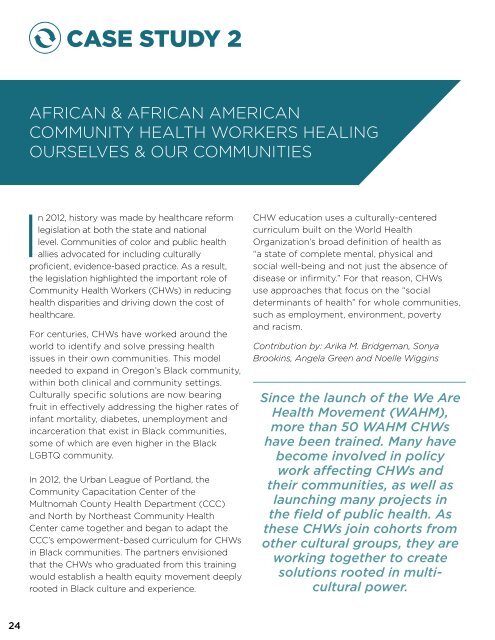State-Of-Black-Oregon-2015
State-Of-Black-Oregon-2015
State-Of-Black-Oregon-2015
You also want an ePaper? Increase the reach of your titles
YUMPU automatically turns print PDFs into web optimized ePapers that Google loves.
CASE STUDY 2AFRICAN & AFRICAN AMERICANCOMMUNITY HEALTH WORKERS HEALINGOURSELVES & OUR COMMUNITIESIn 2012, history was made by healthcare reformlegislation at both the state and nationallevel. Communities of color and public healthallies advocated for including culturallyproficient, evidence-based practice. As a result,the legislation highlighted the important role ofCommunity Health Workers (CHWs) in reducinghealth disparities and driving down the cost ofhealthcare.For centuries, CHWs have worked around theworld to identify and solve pressing healthissues in their own communities. This modelneeded to expand in <strong>Oregon</strong>’s <strong>Black</strong> community,within both clinical and community settings.Culturally specific solutions are now bearingfruit in effectively addressing the higher rates ofinfant mortality, diabetes, unemployment andincarceration that exist in <strong>Black</strong> communities,some of which are even higher in the <strong>Black</strong>LGBTQ community.In 2012, the Urban League of Portland, theCommunity Capacitation Center of theMultnomah County Health Department (CCC)and North by Northeast Community HealthCenter came together and began to adapt theCCC’s empowerment-based curriculum for CHWsin <strong>Black</strong> communities. The partners envisionedthat the CHWs who graduated from this trainingwould establish a health equity movement deeplyrooted in <strong>Black</strong> culture and experience.CHW education uses a culturally-centeredcurriculum built on the World HealthOrganization’s broad definition of health as“a state of complete mental, physical andsocial well-being and not just the absence ofdisease or infirmity.” For that reason, CHWsuse approaches that focus on the “socialdeterminants of health” for whole communities,such as employment, environment, povertyand racism.Contribution by: Arika M. Bridgeman, SonyaBrookins, Angela Green and Noelle WigginsSince the launch of the We AreHealth Movement (WAHM),more than 50 WAHM CHWshave been trained. Many havebecome involved in policywork affecting CHWs andtheir communities, as well aslaunching many projects inthe field of public health. Asthese CHWs join cohorts fromother cultural groups, they areworking together to createsolutions rooted in multiculturalpower.24


